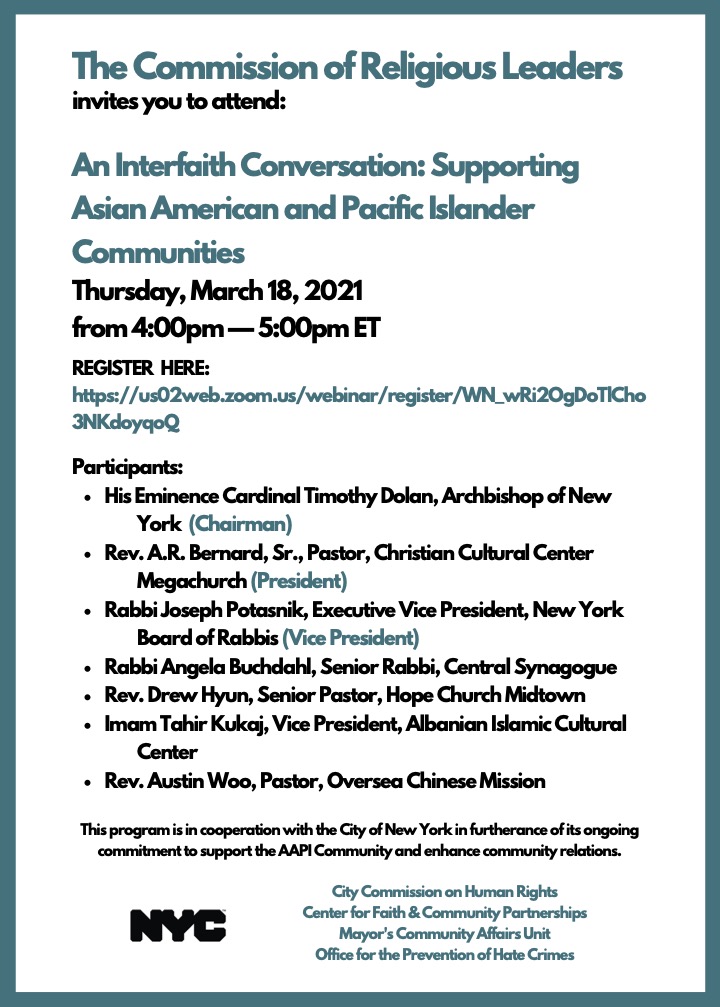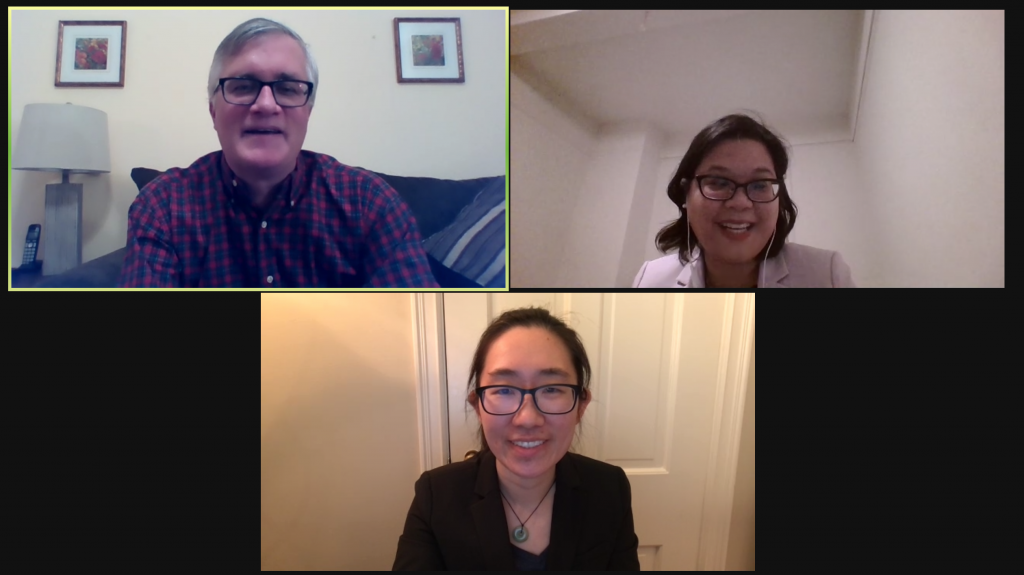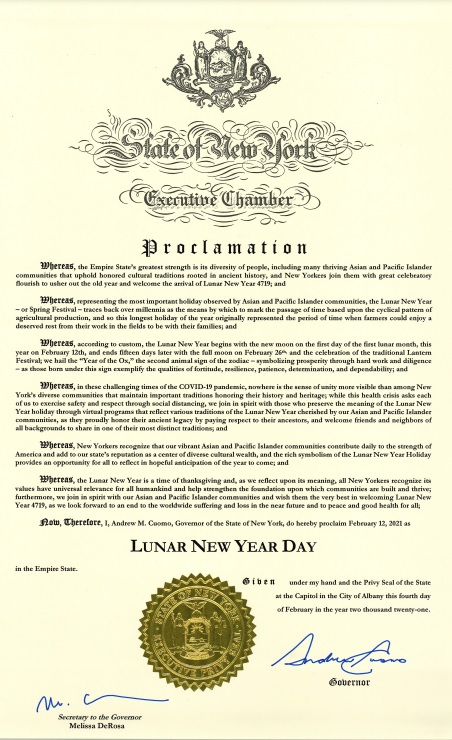The Asian American Bar Association of New York expresses its pain and sorrow at this latest act of violence in Atlanta involving shootings of members of the Asian American and Pacific Islander (AAPI) community. We extend condolences to the families of the victims in these shootings. In this time of increased violence and harassment against the AAPI community, we commend the quick apprehension of the suspect. We urge law enforcement officials to conduct a full investigation, working with community organizations Georgia Asian Pacific American Bar Association (GAPABA) that will be able to offer culturally and historically guided assistance in how hate crimes impact and affect AAPI communities.
Todd Kim Nominated Assistant Attorney General, Environment and Natural Resources at the U.S. Department of Justice
For Immediate Release: Date: March 15, 2021
Contact: Priya Purandare, Executive Director
WASHINGTON – Today, President Joe Biden nominated Todd Kim as Assistant Attorney General, Environment and Natural Resources at the U.S. Department of Justice. If confirmed, Kim will be the first AAPI to lead this division.
“NAPABA offers its sincerest congratulations to Todd Kim on his nomination to lead the Environment and Natural Resources Division of the U.S. Department of Justice,” said A.B. Cruz III, president of NAPABA. “Todd is a talented and accomplished attorney who has extensive litigation experience of high-profile matters of national significance, including winning appeals with the U.S. Supreme Court and across appellate and state supreme courts. NAPABA applauds the Biden-Harris administration on their commitment to diversity with the nomination of Todd, and urges the Senate to confirm him as Assistant Attorney General.”
Todd Kim currently serves as the Deputy General Counsel for Litigation, Regulation, and Enforcement at the U.S. Department of Energy, and previously served as the first Solicitor General of the District of Columbia, and as an appellate attorney with the Environment and Natural Resources Division of the U.S. Department of Justice. Kim was a partner at Reed Smith and clerked for Judge Judith Rogers of the U.S. Court of Appeals for the District of Columbia Circuit. He received his A.B. with honors from Harvard College and his J.D. with honors from Harvard Law School.
###
The National Asian Pacific American Bar Association (NAPABA) represents the interests of approximately 50,000 legal professionals and nearly 90 national, state, and local Asian Pacific American bar associations. NAPABA is a leader in addressing civil rights issues confronting Asian Pacific American communities. Through its national network, NAPABA provides a strong voice for increased diversity of the federal and state judiciaries, advocates for equal opportunity in the workplace, works to eliminate hate crimes and anti-immigrant sentiment, and promotes the professional development of people of color in the legal profession.
PRESS RELEASE: MENG AND HIRONO TO INTRODUCE LEGISLATION TO COMBAT SURGE OF ANTI-ASIAN HATE CRIMES
This press release has been issued by the Offices of Congresswoman Grace Meng and Senator Mazie Hirono.
For Immediate Release: March 11, 2021
Contacts:
- MENG: Mark Olson, 202-819-5580
- HIRONO: Martha Spieker, 202-365-7943
Legislation comes as Asian Americans and Pacific Islanders experience wave of physical, verbal, and online attacks
WASHINGTON, D.C. – U.S. Rep. Grace Meng (NY-06), First Vice Chair of the Congressional Asian Pacific American Caucus (CAPAC), and U.S. Senator Mazie K. Hirono (D-HI), Executive Board Member of CAPAC, announced their plan to reintroduce the COVID-19 Hate Crimes Act, which seeks to address the ongoing hate and violence targeted toward Asian Americans and Pacific Islanders (AAPIs) by providing greater assistance with law enforcement response to COVID-19 hate crimes and creating a position at the Department of Justice to facilitate expedited review of such cases.
Specifically, the bill would:
- Designate an officer or employee of the Justice Department to facilitate expedited review of COVID-19 hate crimes reported to federal, state, and/or local law enforcement;
- Issue guidance for state and local law enforcement agencies to:
- establish online reporting of hate crimes or incidents, and to have online reporting available in multiple languages;
- expand culturally competent and linguistically appropriate public education campaigns, and collection of data and public reporting of hate crimes; and
- Issue guidance describing best practices to mitigate racially discriminatory language in describing the COVID–19 pandemic, in coordination with the Secretary of Health and Human Services and the COVID–19 Health Equity Task Force and community-based organizations.
“The ongoing anti-Asian hate crimes and incidents, especially against our elderly Asian Americans, is absolutely horrific. I am honored to introduce the COVID-19 Hate Crimes Act with Senator Hirono to address this disgusting pattern of hate,” said Congresswoman Meng. “Before this pandemic started, I urged everyone—including elected officials—to not blame Asian Americans for the virus. My words were not heeded. The former president and his Congressional Republican enablers trafficked racist, bigoted terms to describe COVID-19. In doing so, their language stoked people’s fears and created an atmosphere of intolerance and violence, which persists even today. Since the beginning of the pandemic there has been nearly 3,000 reported incidents of physical, verbal, and online attacks against Asian Americans. Even in my own district in Queens, New York, Asian Americans have been attacked. To combat those acts, we need DOJ to prioritize addressing these heinous acts by designating a point person for these COVID-19 related hate crimes; make it easier for victims to report crimes committed against them; and expand public education campaigns to address COVID-19 hate crimes and incidents. This must end and it is why we are working to ensure our justice system has the people and resources to effectively account for and mitigate anti-Asian hate crimes. I look forward to this bill becoming law.”
“We’ve seen the horrifying consequences of racist language as AAPI communities across our country experience hate crimes and violence related to the pandemic,” said Senator Hirono. “The COVID-19 Hate Crimes Act addresses the surge in violence against AAPI communities by dedicating an official at the Department of Justice to expeditiously review hate crimes reported to law enforcement. The bill also provides resources for communities to come together and fight intolerance and hate. This is no less than victims deserve.”
“We are grateful for Senator Hirono and Representative Meng’s leadership in responding to the increased attacks on Asian Americans during the ongoing COVID-19 pandemic,” said John C. Yang, President and Executive Director of Asian Americans Advancing Justice | AAJC. “We need improvements in the reporting and handling of COVID-19-related hate crimes by law enforcement at the local, state, and federal levels, as well as making systems more accessible for people with limited proficiency in English. We appreciate the emphasis on linguistically appropriate and culturally competent engagement on data collection and reporting. Asian Americans Advancing Justice | AAJC is committed to countering hate in all its forms, and we will to continue to push for a comprehensive approach to documenting and addressing hate crimes and prioritizing health and safety for all.”
“NAPABA applauds Senator Hirono and Congresswoman Meng for their decisive action to introduce legislation responding to the rise in anti-Asian hate incidents during the COVID-19 pandemic,” said. A.B. Cruz, III, president of the National Asian Pacific American Bar Association (NAPABA). “NAPABA is committed to ensuring that hate crimes against the Asian American community are properly investigated and prosecuted. The expedited review of hate crimes reported to federal, state, and local law enforcement by the Department of Justice will increase accountability in addressing hate against our community, and establishing a platform for online reporting of hate crimes and incidents in multiple languages will allow more victims to come forward.”
# # #
The Commission of Religious Leaders Presents: An Interfaith Conversation: Supporting Asian American and Pacific Islander Communities on March 18, 2021 at 4 pm
Members of the Asian American and Pacific Islander (AAPI) communities have been experiencing a troubling increase in bias incidents and hate crimes. This program will provide interfaith leaders with the opportunity to express unity and support for the AAPI community and explore concrete ways that clergy can be proactive in confronting bias, discrimination and hate crimes.
Please register for the webinar here at:
https://us02web.zoom.us/webinar/register/WN_wRi2OgDoTlCho3NKdoyqoQ

NAPABA Calls for Action to End Hate Violence Against Asian Americans
For Immediate Release: Date: March 2, 2021
Contact: Priya Purandare, Executive Director
WASHINGTON—This past Friday, the U.S. Department of Justice announced it would investigate the rise in hate-based violent extremism against Asian Americans that has occurred since the start of the COVID-19 pandemic. The National Asian Pacific American Bar Association (NAPABA) applauds this necessary undertaking and unequivocally condemns and rejects the violence that has been directed at the Asian American and Pacific Islander (AAPI) community and calls for appropriate law enforcement efforts to investigate and prosecute offenders.
Since the start of the pandemic, there have been over 3,000 recorded hate incidents against the Asian American community, along with concern that law enforcement has been slow or reticent to investigate the incidents.
“NAPABA is deeply troubled by the continued rise of hate crimes and violence against the Asian American community and the hesitant response by the government to counter this disturbing and unacceptable trend,” said A.B. Cruz III, president of NAPABA. “While we appreciate President Biden and the Department of Justice’s acknowledgement of this crisis, we need our government to do more to protect AAPIs. There needs to be proactive coordination between local, state and federal authorities, including prevention and prosecution against such crimes. NAPABA has, and will, continue to work diligently to provide support to assist victims and their families, and action and advocacy to prevent hate crimes and acts of violence against the AAPI community.”
In January, President Biden issued his Memorandum Condemning and Combating Racism, Xenophobia, and Intolerance Against Asian Americans and Pacific Islanders in the United States . However, the attacks against the AAPI community have become even more prominent in February, including:
- An 84-year-old Thai American man in San Francisco was shoved to the ground during his morning walk and died two days later;
- A 91-year-old Chinese American man In Oakland was attacked and pushed to the ground when several shops were vandalized in Chinatown;
- A 64-year-old Vietnamese American woman in San Jose was robbed following a Lunar New Year’s celebration;
- A 61-year-old Filipino American in New York had his face slashed with a box cutter on the subway; and
- A 52-year-old Chinese American woman in Queens, New York was physically attacked and shoved to the ground while waiting in line at a bakery.
NAPABA’s hate crimes resources, including providing pro bono legal assistance, can be found here. NAPABA’s Stand Against Hate campaign, denouncing racism can be found here. NAPABA and its affiliates’ past statements on anti-Asian hate can be found here.
###
The National Asian Pacific American Bar Association (NAPABA) represents the interests of approximately 50,000 legal professionals and nearly 90 national, state, and local Asian Pacific American bar associations. NAPABA is a leader in addressing civil rights issues confronting Asian Pacific American communities. Through its national network, NAPABA provides a strong voice for increased diversity in government and the judiciary on the local, state, and federal levels, advocates for equal opportunity in the workplace, works to eliminate hate crimes and anti-immigrant sentiment, and promotes the professional development of people of color in the legal profession.
Pro Bono and Community Service Committee Presented with Certificate of Commendation at NYS Senators’ Lunar New Year Virtual Celebration

New York State Senators John Liu (11th District, Queens), Andrew Gounardes (22nd District, Brooklyn), Brian Kavanagh (26th District, Manhattan) and Toby Stavisky (16th District, Queens) hosted a Lunar New Year virtual celebration Tuesday evening, February 16, featuring performances from AAPI youth and community honorees. The event was well-attended by city, state and federal elected officials, as well as community leaders and their organizations.
Senator Kavanagh presented May Wong, Esq., and Olympia Moy with a certificate of commendation to recognize the work of AABANY’s Pro Bono and Community Service Committee in providing invaluable legal assistance to the AAPI community during the pandemic. May Wong and Olympia Moy were proud to accept the certificate on behalf of the Pro Bono and Community Service Committee. In their acceptance speech, they detailed the committee’s success in creating a one-day “in-person” clinic in July 2020 to assist tenants with paper applications for the COVID Rent Relief Program. When the COVID Rent Relief Program was extended to February 2021, law students volunteered again to establish a two-week remote hotline service to assist non-English speaking tenants apply via telephone. They were able to assist callers in Mandarin, Cantonese, and Spanish with the help of the committee’s community partners, Chinatown CLT and GOLES. May Wong and Olympia Moy concluded their speech by expressing gratitude towards the State for its effort in addressing the State’s housing and poverty crisis and strongly encouraged the State to “direct emergency financial relief to tenants and property owners in meaningful programs that can provide permanent rental assistance and increased access to rental subsidies.”
Thank you to all the attorney volunteers and law students who helped AABANY and the community, especially May Wong, William Lee, Karen Lin, Nicholas Loh, Xinyi Shen, and Olympia Moy.
Congratulations to the Pro Bono and Community Service Committee on this well-deserved recognition! To learn more about the Committee and all its wonderful work, go to probono.aabany.org. They are always looking for more volunteers so email them at clinic.volunteer@aabany.org if you can help.
NAPABA is Proud to Congratulate Past President John C. Yang
2021 ABA Spirit of Excellence Award Honoree

President and Executive Director of Asian Americans Advancing Justice | AAJC and NAPABA Past President John C. Yang is among the five honorees of the American Bar Association’s 2021 Spirit of Excellence Award. NAPABA proudly congratulates John for his illustrious accomplishments in every facet of the legal profession and for championing the Asian American & Pacific Islander community.
The Spirit of Excellence Award celebrates the efforts and accomplishments of lawyers who work to promote a more racially and ethnically diverse legal profession. The awards are presented to lawyers who excel in their professional settings; who personify excellence on the national, state, or local level; and who have demonstrated a commitment to racial and ethnic diversity in the law.
John has achieved professional excellence in his wide-ranging career that has spanned four different practice settings. He has served as partner at a law firm practice in Washington, DC; led as a Director of Legal affairs at a Fortune 200 company in Shanghai, China; served as a Senior Advisor within the Obama Administration; and most recently, directs the organizational efforts to fight for civil rights and empowering Asian Americans to create a more just America at the Asian Americans Advancing Justice | AAJC.
At each stage of John’s career, he has served as a leader, role model, and mentor to countless racially and ethnically diverse individuals, helping to guide many promising lawyers’ careers. John has tirelessly promoted and supported attorneys who were interested in pursuing a federal judgeship, resulting in the nomination and confirmation of more than 25 Asian American Article III judges. His work has also opened doors for attorneys interested in serving in presidential administrations.
John’s advocacy has reached far beyond the Asian American & Pacific Islander community. In addition to his leadership roles within NAPABA, John has served as Chair of the Minority Caucus of the ABA House of Delegates where he worked closely with bars of color to advance distinct and unifying agenda items and resolutions and he has served on the ABA Commission on Racial & Ethnic Diversity. Present day, John serves on the Executive Committee of the Leadership Conference on Civil and Human Rights at Asian Americans Advancing Justice | AAJC where he collaborates closely in coalition with other organizations representing the interests of minority groups.
John used his parents’ experiences as well as the injustices that he personally encountered as an immigrant to the United States from Taiwan to navigate his own path while blazing a trail for others to follow. NAPABA is proud to have supported John’s nomination as a Spirit of Excellence honoree.
Spirit of Excellence Ceremony
NAPABA invites you to join in celebration as John is recognized and honored at the ABA Spirit of Excellence Award Virtual Ceremony on February 18 at 5 PM ET. In addition to John, honorees include Barbara L. Creel, Román D. Hernández, Sherrilyn Ifill, and Lori E. Lightfoot. To register for the awards ceremony during the ABA Midyear Meeting, please click here.
Governor Cuomo Proclaims Lunar New Year Day in New York State
On February 4, Governor Cuomo issued a proclamation recognizing Lunar New Year Day as a deep-rooted day of celebration for Asian and Pacific Islander communities. February 12 will mark the beginning of the “Year of the Ox,” an animal whose association with hard work and diligence has universal relevance amid the ongoing COVID-19 pandemic. In these challenging times, Governor Cuomo calls upon all New Yorkers to “join in spirit with our Asian and Pacific Islander communities and wish them the very best in welcoming Lunar New Year 4719, as we look forward to an end to the worldwide suffering and loss in the near future and to peace and good health for all.”

NAPABA Commends President Biden’s Memorandum on Anti-AAPI Xenophobia
For Immediate Release: Date: January 27, 2021
Contact: Priya Purandare, Executive Director
WASHINGTON – The National Asian Pacific American Bar Association (NAPABA) commends President Biden’s Presidential Memorandum denouncing discrimination and xenophobia against the Asian American and Pacific Islander (AAPI) community.
In the memorandum, President Biden directed the Attorney General, to investigate, document and address hate incidents and harassment against AAPIs. Additionally, the President directed the Department of Health and Human Services, in coordination with the COVID-19 Health Equity Task Force, to issue guidance, including language access, toward AAPIs in the nation’s COVID-19 response.
“Members of the Asian American and Pacific Islander community have been victims of increased acts of discrimination, hate and racist violence, and harassment during the COVID-19 pandemic, much of which has been underreported by the media,” said NAPABA president A.B. Cruz III. “We applaud President Biden’s efforts to unify the country by recognizing and addressing these despicable acts that have devastated our community and businesses. We strongly urge all leaders, organizations and individuals to join us and take a stand against hate.”
According to the Stop AAPI Hate project, there were over two thousand documented incidents of hate or violence targeting Asian Americans and Pacific Islanders over the summer of 2020 related to COVID-19.
Please see NAPABA’s Hate Crimes Center for more resources on how to respond to acts of hate. Organizations are invited to join NAPABA’s Stand Against Hate campaign. NAPABA addressed and condemned racist language in an organization statement last fall.
###
The National Asian Pacific American Bar Association (NAPABA) represents the interests of approximately 50,000 legal professionals and nearly 90 national, state, and local Asian Pacific American bar associations. NAPABA is a leader in addressing civil rights issues confronting Asian Pacific American communities. Through its national network, NAPABA provides a strong voice for increased diversity in government and the judiciary on the local, state, and federal levels, advocates for equal opportunity in the workplace, works to eliminate hate crimes and anti-immigrant sentiment, and promotes the professional development of people of color in the legal profession.
NAPABA Calls on Biden Administration to Stay True to his Commitment to Create a Truly Representative Government
For Immediate Release: Date: January 8, 2021
Contact: Priya Purandare, Executive Director
Biden Administration Lacks AAPI Cabinet Secretary for The First Time in 20 Years
WASHINGTON—The National Asian Pacific American Bar Association (NAPABA) calls upon President-elect Joe Biden to remain committed to his promise to assemble a diverse Cabinet and administration that truly reflects America as he continues to appoint senior leadership candidates. For the first time in 20 years, there will not be an Asian American and Pacific Islander (AAPI) Cabinet Secretary despite the community having put forth one of the most extensive and impressive pool of candidates ever.
“NAPABA stands dismayed that AAPIs will not be represented at the Secretary level position in the inaugural Biden Cabinet,” said A. B. Cruz III, president of NAPABA. “While there have been many historic positive firsts for the incoming Administration, the AAPI community cannot help but feel dismissed. Countless individuals, including numerous members of Congress, community leaders across a broad spectrum, and many leading organizations, including many non-AAPIs, are calling for greater AAPI representation across leadership roles in the ongoing transition appointment process. We trust the new Administration will specifically address this apparent disconnect by nominating and placing AAPIs into key leadership roles going forward.”
###
The National Asian Pacific American Bar Association (NAPABA) represents the interests of approximately 50,000 legal professionals and nearly 90 national, state, and local Asian Pacific American bar associations. NAPABA is a leader in addressing civil rights issues confronting Asian Pacific American communities. Through its national network, NAPABA provides a strong voice for increased diversity in government and the judiciary on the local, state, and federal levels, advocates for equal opportunity in the workplace, works to eliminate hate crimes and anti-immigrant sentiment, and promotes the professional development of people of color in the legal profession.

